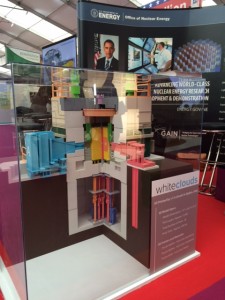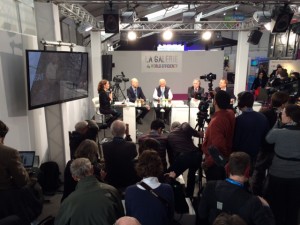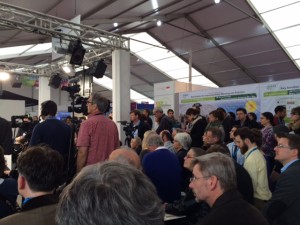Paris Diary: Making Nuclear Visible and Relevant at COP21
While the delegates discussing the actual COP agreement are sequestered in a building not accessible to others, there is important work going on elsewhere in Paris when it comes to nuclear energy advocacy. Even if the political solutions don't work here, there is no reason the technical solutions can't continue full steam ahead to produce clean energy for all who want and need it.

DOE Reactor at booth
Nuclear for Climate and the U.S. Department of Energy exhibits are the most visible nuclear presences at COP21. Those who stop by the Nuclear for Climate booths (we have them in the two exhibit areas here) move that needle forward. Even the gawkers who stop to take photos of the Nuclear for Climate booth may walk away with a little pixie dust that could take hold in the future. These people are stunned at the audacity that the nuclear industry sees itself as a solution to the climate change problem. (I know this to be true because they have actually voiced this to me.)
We are getting strong support and visibility from outside the nuclear industry. A press conference on Thursday, December 3, hosted by Energy for Humanity, and featuring four of the world's most notable climate scientists, drew a standing room only crowd of reporters and interested listeners. Dr. Ken Caleira, Dr. Tom Wigley, Dr. Kerry Emanuel, and Dr. James Hansen gave extremely strong presentations where they emphasized "we've done the math" and "we can't power the world without nuclear energy."

Press conference in Paris, France
Dr. Caldeira talked about how he is a former nuclear protester who now supports it. "We must rise above prejudice against nuclear," he said, adding that, "People are hitching their agenda (against nuclear) to the climate agenda." The message of all four scientists was for the world to "rise above the prejudice" and even the playing field for nuclear energy. "We must stop thinking of '50s and '60s (nuclear) technology," Dr. Emanuel stressed, saying that new nuclear technology is "genuinely exciting."
The overall message from the group was that we can't close the door to any technology that Dr. Hansen said "has tremendous power to be a big part of the solution." Despite this, there were still some very negative comments and questions from reporters.

Press coverage at conference
I attended one of the morning meetings, which included a United Nations Framework Convention on Climate Change representative and several corporate business representatives. A carbon tax was a major topic during the briefing. The expectation of the speakers was that there will be no international carbon tax, but rather regional or individual country options. But one of my favorite comments from came from a Russian metals company executive who included nuclear energy in his comments and thought "Germany has a surprising view" of nuclear. He stressed that a "commitment to nuclear and support for technology is important."
We are continuing this process of moving the needle forward for nuclear. A good start is being made in Paris, where there are a large number of influential decision-makers from around the world, all in one place.
Tari Marshall is the Director of Communications and Outreach at the American Nuclear Society. Follow ANS on Twitter and Facebook. And remember to use #Nuclear4Climate and #COP21 hashtags when tweeting.

